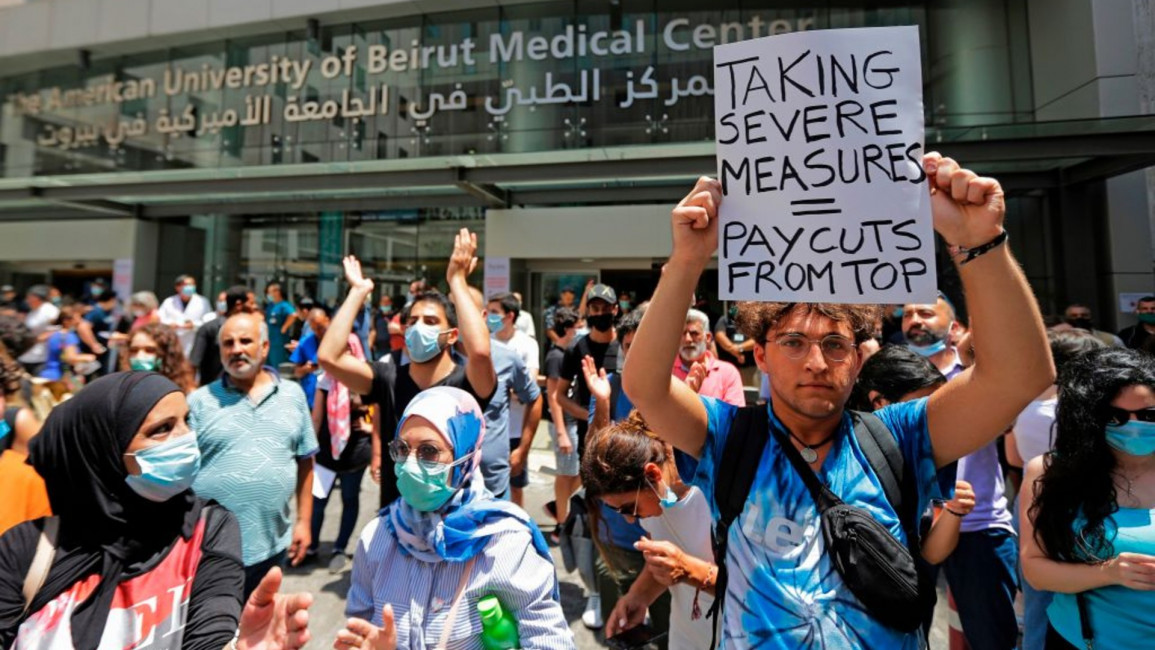
Lebanon's oligarchs crashed the economy, now they're making the people pay
The country's crippling debt as well as its trade deficit have been growing thanks to decisions made by governments, approved by parliaments, and in some cases made possible through the financial wizardry of the central bank (BdL) leadership. The BdL has been on its own journey of accumulating further debt to allow the political and economic survival of the establishment.
Although the economy grew, a disproportionately high share of the pie went to the top one percent, favouring most of all the banks and real estate speculators, at the expense of most of their counterparts in productive sectors. Corruption was made into a mode of governance, trickling down to every level of public administration and the private sector.
Since the crisis started, however, it is not those profiteers who have paid for their risky investments and their exploitation of our society's wealth and labour. On the contrary, the rich and politically favoured have been able to pull their money out of Lebanon while the rest of us could not access our modest savings in the banks. And what did the people's supposed representatives do about it?
Absolutely nothing.
 |
The rich and politically favoured have been able to pull their money out of Lebanon while the rest of us could not access our modest savings in the banks |  |
At that moment when a central bank's intervention is most important, governor Riad Salameh chose a very different path; he denied any jurisdiction to impose capital controls without a parliament's decision, and he adopted a method of as little transparency as possible when it comes to available foreign exchange reserves needed to survive the crisis.
Today, we know that Central Bank governor Salameh has also allegedly made up billions of assets that do not exist in an attempt to make it look like BdL was not drowning in losses.
And when BdL did act, we wished it had not. Instead of forcing banks to end their arbitrary and classist measures, Salameh decided instead to legitimise these measures and set policies for withdrawing Lebanese Lira from USD bank accounts, adding further pressure on the already depreciating Lira.
Twitter Post
|
Salameh is not just a person in this case, he represents a class coalition of oligarchs, including both politicians and bank owners, who have accelerated the collapse, intentionally and sometimes due to inaction, bringing about the worst possible scenario for ordinary people.
When we talk about the depreciation of the Lebanese Lira (L.L.), what we care about is skyrocketing poverty and inflation rates, and the plummeting value of wages. The political authorities and BdL have overseen a process of general impoverishment. Today, a family that earns 2.4 million L.L. is either in, or on the verge of extreme poverty; and 70 percent of families do not earn more than that.
Read more: Lebanon should default on its debt right now, and here's why
The minimum wage of 675,000 L.L. has become simply an obsolete number that cannot ensure subsistence, and it is still paid in a number of manual jobs across the country. Unemployment is soaring, which further suppresses wages and puts workers in competition with each other, while the government's timid assistance programmes fail to reach most of them.
While people were losing purchasing power and their savings were subjected to a de-facto haircut by Salameh's decision to allow withdrawals on a rate far lower than that of the black market, Salameh and other representatives of the oligarchy went on a crusade against an inevitable haircut policy targeting the largest deposits. They orchestrated an ideological campaign very far away from both reality and the aspirations of a people in uprising.
The politically rooted financial oligarchy did not stop there, and has now successfully accomplished the mission of sabotaging the government's negotiations with the IMF, not because of our concerns about the fund's obsession with austerity and privatisation per se, but rather to prevent a serious restructuring of the banking sector and BdL.
 |
The oligarchs have built all their wealth and power by operating a rigged and dysfunctional system. Today they are letting the system collapse on ordinary people |  |
MPs from political blocs heavily represented in government, sponsored by Speaker Nabih Berri and led by Ibrahim Kanaan from the FPM - the party with the largest representation in both branches of government -, initiated a committee to "investigate the truths" surrounding public losses in the crisis.
The result? A set of controversial calculations and conclusions that to nobody's surprise led to an endorsement of BdL and the banks' rhetoric and numbers.
This move gave undeserved legitimacy to a plan that had been proposed by the banks' official lobby as an alternative to the government's Financial Recovery Plan, one that seeks to throw all the burden of paying for the crisis onto shoulders of the state, and therefore the public.
After losing two members of his negotiating team including the former Finance Ministry Director General Alain Bifani, Prime Minister Hassan Diab seems to have bowed to the vested interests, perhaps for the sake of political continuity.
 |
Corruption was made into a mode of governance |  |
Today, all evidence points towards the government's intention to propose new numbers and a new plan that favours the banks and the one percent even more than the first one.
A plan is needed to get back on the negotiation table with the IMF. However, that institution is not likely to accept a document with incorrect estimations and unconvincing solutions. By all chances, it has become more difficult to secure an IMF bailout, let alone impose any better, or more radical solutions to the crisis.
The oligarchs have built all their wealth and power by operating a rigged and dysfunctional system. Today they are letting the system collapse on ordinary people. There is no better way to describe this counterrevolution than simply as a top-down class war, and one that they are winning. Now more than ever - despite the depressing days we are living through - is the time to get organised and fight back.
Nizar Hassan is a Lebanese organiser, researcher and podcaster based in Beirut. He is a co-founder of the progressive political movement LiHaqqi, he researches workers rights and social movements, and co-hosts The Lebanese Politics Podcast.
Opinions expressed in this article remain those of the author and do not necessarily represent those of The New Arab, its editorial board or staff.




